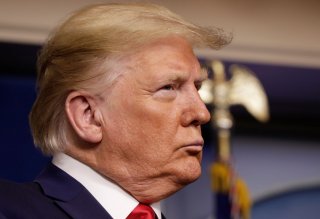How Trump Can Change Sanctions to Allow Anti-Coronavirus Aid to North Korea
It would help everyone.
The coronavirus has no respect for national borders. More than 366,000 people in 166 countries have been sickened by the virus, including 81,000 in China, nearly 64,000 in Italy, and more than 43,000 in the United States. Despite the usual hyperbolic claims from the Kim Jong-un regime, it’s a near certainty that North Korea—one of the poorest countries in the world with a lackluster and overwhelmed health system on a good day—is one of the countries infected. In fact, health experts are concerned that the toll inside the North is exponentially higher than what North Korean officials are reporting.
That concern also resides in the Donald Trump administration, which made it clear early on that Washington was more than happy to facilitate humanitarian assistance to countries around the world battling the virus. President Trump followed that antiseptic government declaration with a personal touch by writing a letter to Kim expressing his interest in assisting Pyongyang with relief if Pyongyang finds itself unable to manage the influx of patients. Trump’s outreach is partly political—at a time when his administration has few foreign policy victories to crow about, the president is personally incentivized to demonstrate to the American people that he is still going about the business of statesmanship. But it’s also a common-sense humanitarian measure given how easy it is for the coronavirus to spread.
In normal times, a foreign government, company, or humanitarian agency wishing to send items to North Korea would need to make an official request to the UN Security Council’s North Korea sanctions committee, which is responsible for vetting the request to ensure it doesn’t violate any of the export restrictions currently enshrined in various UN Resolutions. The petitioner must provide a copious amount of information to the committee, including the purpose of the request; where the items are going; the quantity and method of the shipment; the travel route of the cargo; how much the shipment is worth in dollar terms; the reasons for seeking an exception; and which financial institutions are involved with the transactions. Once all of this information is investigated, evaluated, sorted, and discussed within the sanctions committee, the request is approved, denied, or delayed in the event additional information is required to make a final judgment.
The process can be overlaid with delays and requires approval (or at least no veto) from the Security Council’s permanent members. The result is often long wait times that can stretch on for months. Doctors who have worked in North Korea for years, such as Dr. Kee Park of Harvard Medical School, have frequently denounced the exemption process as overly bureaucratic and time-consuming for items as uncontroversial as water treatment plants and ambulances. According to Korea Peace Now, 3,968 people—the majority young children—have died due to funding shortfalls and UN delays.
Needless to say, these are not ordinary times. The coronavirus is a highly contagious virus that impacts the respiratory systems of the most vulnerable sectors of the population. To its credit, the North Korea Sanctions Committee has approved several humanitarian exemption requests this year to deal with the virus, including one in February from the World Health Organization and another from Doctors Without Borders.
The problem, however, is two-fold. First, the UN committee can only process so many requests at once given the nature of their work and the guidelines its members must follow. Second, the North Korean authorities are incredibly secretive and sensitive to foreign organizations traversing through their territory without restriction. Acceptance of international aid is not a sure thing in North Korea. Pyongyang has declined previous offers of international assistance due in part to the concern of spies running amok. Coronavirus poses its own unique challenges; even when diagnostic equipment is approved, North Korea has held up shipments at the border in order to screen for the virus. The backlog of cargo at the ports and border posts can be as bad as the disease itself. All of these problems will have to be cleared up if North Korea has a fighting chance to contain the spread of the virus within its general population.
The Trump administration will have to instruct its diplomats at the Security Council that Washington will in no uncertain terms be a positive force and use its considerable power on the committee to rush these desperately needed medical items through. When he’s not managing the coronavirus crisis at home, President Trump should get on the phone with Russian President Vladimir Putin, Chinese President Xi Jinping, and South Korean President Moon Jae-in to encourage all of them to serve as force multipliers for the effort. (While Kim Jong-un has given Moon the cold shoulder over the past year, there may be room for cooperation on a public health epidemic that threatens the entire Korean Peninsula). Furthermore, Washington should use its seat on the UN committee to press its members to prioritize humanitarian exemptions that deal with coronavirus mitigation for the foreseeable future. The North Koreans, in turn, must redouble their efforts and ensure the medical equipment shipped to port gets through customs and into the field as quickly as possible.
Everybody must do their part and carry their weight. The slightest delay from any of the actors involved could result in preventable deaths.
Daniel R. DePetris is a columnist at the Washington Examiner and a contributor to the National Interest.
Image: Reuters

